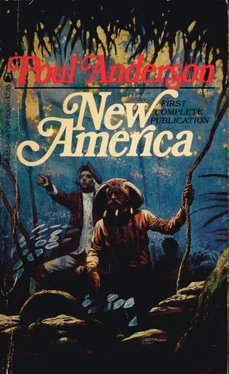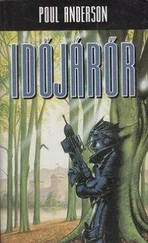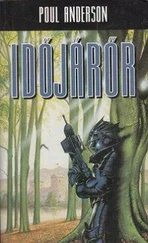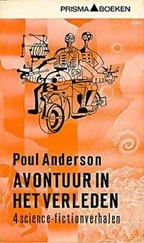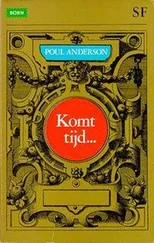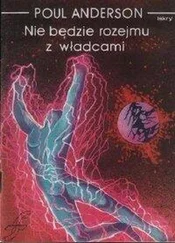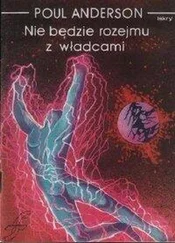“Look, air helmets have improved beyond belief since I was young. Why, when I was a baby they didn’t exist! Who says we must stop here? Who says we can’t work out something better, a biochemical treatment maybe, which’ll let every man, woman, and child on Rustum live anywhere that he or she likes?”
The assembly stirred and exclaimed. He cut through the noise:
“Moondance proposes a joint research effort, which will itself be another unifying element, an effort to discover means of overcoming the handicap that most of our children are born with. I know that’s been daydreamed about for a long time. Part of the reason nothing’s happened has been that close cooperation of both human breeds is obviously essential, and we lowlanders, at least, have had no motivation toward it, especially with so much else to keep us busy. Tonight we do urge moving from daydream to reality.
“If we succeed in that, the problems associated with admitting immigrants will become trivial. Furthermore, if we commit ourselves to an open-door policy, then the knowledge that yonder fleet is aimed at us will be one hell of a stimulus to solving this merely scientific problem!”
Again he drank, before he added mildly, “Of course, without that open-door policy, the low-landers will have no reason to help in such a project, or to promise to help bear the burden if the project fails. If you vote to close the gates, then to hell with you. Stay up here in the isolation you like so much.”
Uproar. Dorcas Hirayama hammered for odor. As the racket died, a voice from the middle of the room shouted, “Why do you want a lot of damn foreigners?”
Coffin lit his pipe. “I was coming to that,” he said, “impolitely though the question may have been put.
“Whether or not we can crack the air-pressure barrier, we can’t expect to assimilate the immigrants quickly or easily. To some extent, probably we can never assimilate them at all, in the sense of making them or their descendants identical with us. Besides the obstacles raised by their unfamiliarity with Rustum, why, they’re coming here to preserve a way of life, not lose it in a melting pot.
“As said, I think with some sacrifice by both highlands and lowlands, whatever happens otherwise, we can avoid creating a proletariat. At worst, we’ll have to tide over the older generation, and make some economic-industrial changes to accommodate the younger one.
“But as for that second aspect Dr. O’Malley discussed—the introduction of foreign philosophies, minds strange to our own—”
He laid down his pipe. He filled his lungs and roared across the hall, echoes thunderous even in his deaf ears:
“God damn it, that’s exactly what we need/”
And afterward, into their shock, himself most gently:
“Not many hours ago, I stood on North Bridge and talked to a very puzzled and embittered young man. He couldn’t comprehend why his elders wanted to cut us off from the stars. We ended by considering ways and means whereby Rustum might acquire those spaceships when they arrive.
“Unlikely, of course. The point is, the news had made him realize how suffocated he is in this smug backwater we’ve become. Oh, yes, we have big jobs ahead of us. But who will do them? People exactly like us? If so, what’ll there be afterwards, except sitting back and admiring the achievements of the ancestors?
“I’ll tell you what there’ll be. Hell to pay!
“I’ve heard a great deal of worry expressed about creating a rootless, impoverished proletariat, with no stake or interest in continuing the society that bred it. Ladies and gentlemen, have you considered the danger in creating a proletariat of the soul?
“Let foreigners in. Welcome unexpected insights, weird ways, astonishing thoughts and feelings. We may not always like them—probably we often won’t—but we’ll experience them and they’ll make us look to the foundations of our own beliefs. If there’s anything at all to the idea of liberty and individual worth, which we’re supposed to be keeping alive, then on the whole, we’ll be the better for being challenged. And it works two ways, you know. They’ll learn from us. Together, the old and the new dweller on Rustum will do and think what neither alone could dream.”
Coffin drew breath. He had gotten a little dizzy from so much talking. Sweat was on his skin and his knees shook.
He finished hoarse-voiced: “As most of you know, seeing how I brag about them, I have a couple of great-grandchildren. I don’t want to protect them from the cosmos, any more than that boy I met wants to be protected.
“No, they deserve better.”
When, after lunations, the debates were ended, the hard bargains driven, the resolutions drawn and passed, the law established that Rustum would greet and help the offspring of Earth—
Daniel Coffin sat alone in his room in the de Smet house. He had turned off the fluoros. Moonlight streamed through an open window, icy as the air. Afar reached the taut silence of winter night, barely disturbed by a rumble from the river, whose hardness had begun to break into floes under a first faint flowing of spring.
The coldness touched Eva’s portrait on a table. He picked it up. His hand trembled. He was very tired; it would be good to lie down and rest.
“Sweetheart,” he whispered. “I wish you could have seen.” He shook his head, ran fingers through his hair. Maybe you did? I don’t know.
“You see,” he told his memory of her, “I did what I did because that was what you’d have wanted. Only because of you.”
Here ends the story of High America. But other worlds than Rustum were to receive the seed of Earth. Each responded in its own way to the men and women who had fled their own ruined planet…
THE QUEEN OF AIR AND DARKNESS
The last glow of the last sunset would linger almost until midwinter. But there would be no more day, and the northlands rejoiced. Blossoms opened, flamboyance on firethorn trees, steel-flowers rising blue from the brake and rainplant that cloaked all hills, shy whiteness of kiss-me-never down in the dales. Flitteries darted among them on iridescent wings; a crownbuck shook his horns and bugled. Between horizons the sky deepened from purple to sable. Both moons were aloft, nearly full, shining frosty on leaves and molten on waters. The shadows they made were blurred by an aurora, a great blowing curtain of light across half heaven. Behind it the earliest stars had come out.
A boy and a girl sat on Wolund’s Barrow just under the dolmen it upbore. Their hair, which streamed halfway down their backs, showed startlingly forth, bleached as it was by summer. Their bodies, still dark from that season, merged with earth and bush and rock, for they wore only garlands. He played on a bone flute and she sang. They had lately become lovers. Their age was about sixteen, but they did not know this, considering themselves Outlings and thus indifferent to time, remembering little or nothing of how they had once dwelt in the lands of men.
His notes piped cold around her voice:
“Cast a spell,
weave it well
of dust and dew and
night and you.”
A brook by the grave mound, carrying moonlight down to a hill-hidden river, answered with its rapids. A flock of hellbats passed black beneath the aurora.
A shape came bounding over Cloudmoor. It had two arms and two legs, but the legs were long and claw-footed and feathers covered it to the end of a tail and broad wings. The face was half human, dominated by its eyes. Had Ayoch been able to stand wholly erect, he would have reached to the boy’s shoulder.
The girl rose. “He carries a burden,” she said. Her vision was not meant for twilight like that of a northland creature born, but she had learned how to use every sign her senses gave her. Besides the fact that ordinarily a pook would fly, there was a heaviness to his haste.
Читать дальше
